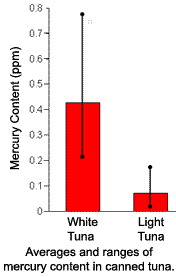Neuroscience For Kids
Mercury in Canned Tuna
December 7, 2010
 Fish has sometimes been called "brain food" because it is a good source of
protein and omega-3 fatty acids. One favorite fish for many people is
canned tuna. But with its health benefits, canned tuna may also have
health risks because it contains mercury.
Fish has sometimes been called "brain food" because it is a good source of
protein and omega-3 fatty acids. One favorite fish for many people is
canned tuna. But with its health benefits, canned tuna may also have
health risks because it contains mercury.
Mercury, especially methylmercury, is a neurotoxin. Mercury is especially dangerous to developing babies because this chemical can cross the placenta and the blood-brain barrier. Children exposed to mercury may be born with symptoms resembling cerebral palsy, spasticity and other movement abnormalities, convulsions, visual problems and abnormal reflexes. Mercury can also affect brain development by preventing neurons from finding their appropriate place in the brain.
 A new survey by Consumer Reports (January, 2011) shows that only
one or two servings of canned tuna can provide children and young women
with more mercury than advised by the Environmental Protection Agency
(EPA).
A new survey by Consumer Reports (January, 2011) shows that only
one or two servings of canned tuna can provide children and young women
with more mercury than advised by the Environmental Protection Agency
(EPA).
Consumer Reports bought 42 samples of cans and pouches of tuna. Test results of these samples showed:
- EVERY sample contained measurable levels of mercury. The amount of mercury in the samples ranged from 0.018 to 0.774 parts per million.
- White tuna had an averaged mercury content of 0.427 parts per million (ppm).
- Light tuna had an averaged mercury content of 0.071 parts per million (ppm).
 A young woman who eats just one serving (2.5 oz) of white tuna or two
servings of light tuna would exceed the daily safety level for mercury set
by the EPA. Because of the high content of canned tuna, Consumer
Reports recommends that young women and children should limit the
amount of canned tuna they eat. They also advise women who are pregnant
to avoid canned tuna completely.
A young woman who eats just one serving (2.5 oz) of white tuna or two
servings of light tuna would exceed the daily safety level for mercury set
by the EPA. Because of the high content of canned tuna, Consumer
Reports recommends that young women and children should limit the
amount of canned tuna they eat. They also advise women who are pregnant
to avoid canned tuna completely.
References and more information:
- Mercury in Canned Tuna Still a Concern, Consumer Reports, January, 2011.
- Fish Consumption Advisories - US EPA
- Methylmercury - US Food and Drug Administration
Copyright © 1996-2010, Eric H. Chudler, University of Washington
